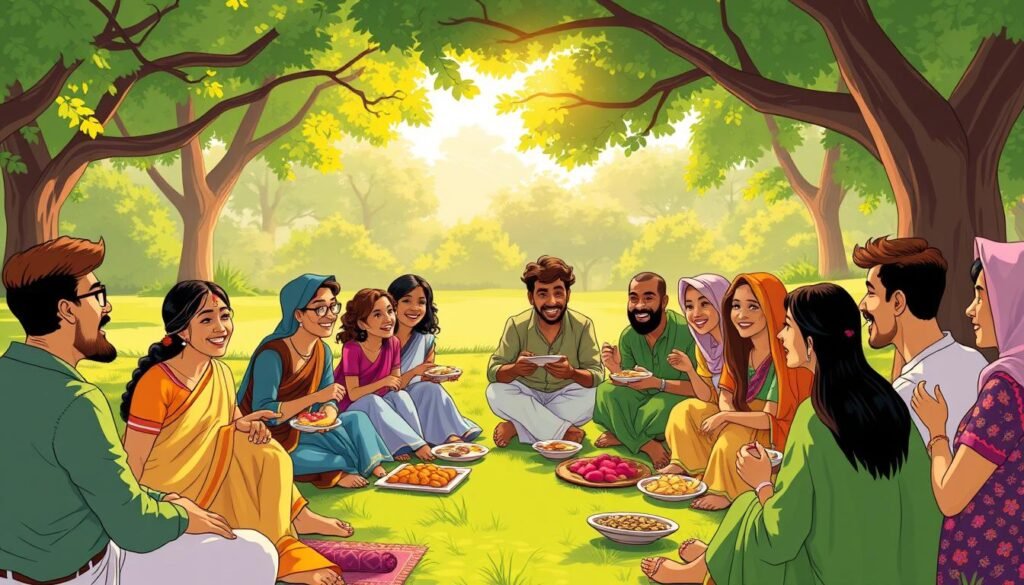Thinking about community in our lives makes me think of the Hadith about gathering. It shows how important being together is in Islamic teachings. It talks about dhikr, or remembering Allah, as key to our faith. Coming together to remember Allah strengthens our bond with Him and each other.
The Qur’an says, “And the remembrance of Allah is greater…” (Qur’an 29:45). It links remembering Allah often to success, as in “And remember Allah abundantly, so that you may be successful” (Qur’an 62:10). Exploring this Hadith shows us how it helps us grow spiritually and build community, which is central to Islam.
Looking into Islamic teachings, we see the value of coming together for dhikr and prayer. The Hadith about gathering reminds us to focus on our spiritual health. It encourages us to build strong relationships with Allah and with each other, a core idea in Islamic teachings and this Hadith.
Understanding the Hadith About Gathering Together
Exploring the importance of gathering together is key. We must look at the original Arabic text and its translation. The Hadith from Sahih Muslim, Book 1, Number 0212, sheds light on community building and spiritual growth. It helps us understand the benefits of coming together in Islam.
Gathering together is linked to spiritual growth. It lets people unite and strengthen their faith. This unity can create a strong sense of community building. As we dive into the Hadith’s historical context and authenticity, we see its value more clearly.
Original Arabic Text and Translation
The original Arabic text of the Hadith stresses the need for gathering to remember Allah. It shows how important community building is in Islam. It also highlights the spiritual growth that comes from worshiping together.
Historical Context of the Revelation
Knowing the historical context of the Hadith is essential. It helps us understand the social and cultural setting of the time. This context makes us appreciate the role of gathering together in building community and fostering spiritual growth.
The Spiritual Significance of Communal Unity in Islam
Thinking about communal unity in Islam makes me think of Muslim gatherings. These gatherings help us feel a sense of belonging and grow spiritually. The Friday prayer is key, bringing Muslims together to worship and connect.
Research shows that activities like Friday prayer boost community engagement by up to 75%. It helps people feel a strong sense of belonging. This feeling is vital for our spiritual growth, connecting us to something bigger than ourselves.
In Islam, unity is a core idea, based on the Quran and the Prophet Muhammad’s teachings. The Quran stresses the value of communal worship and the mosque as a community center. When we gather for Friday prayer, we remember the importance of unity and supporting each other.
The Quran says, “And hold firmly to the rope of Allah all together and do not become divided.” This verse underlines the need for unity in worship and daily life.
Joining Muslim gatherings and Friday prayer strengthens our faith and builds community. It’s important to keep unity and belonging at the heart of our efforts as Muslims.
Blessings Promised in This Sacred Teaching
Gathering together in Islam brings many blessings. The Jumu’ah, or congregational prayer, is a key part of Islamic worship. Believers come together to pray and listen to the Khutbah. This practice is highlighted in Surah Al-Jummah, showing the importance of spiritual duties over worldly ones.
Attending Jumu’ah and participating in congregational prayer brings spiritual rejuvenation and community bonding. The Quran teaches that Allah’s mercy and forgiveness are available to all who seek it, specially on Jumu’ah. Learning about dua for breaking fast in Ramadan shows the value of communal prayer and supplication.

The promise of divine mercy encourages believers to seek knowledge and grow spiritually. Exploring congregational prayer shows its role in building unity and shared purpose in the Muslim community. Embracing these blessings helps us understand the importance of gathering in Islam.
Divine Rewards of Gathering
The divine rewards of gathering are a key part of Islamic teachings, as seen in Jumu’ah. Coming together in congregational prayer brings a sense of community and spiritual growth. It also allows believers to seek guidance from religious scholars.
How Gathering Impacts Mental Well-being
Gathering in Islam deeply affects our mental health. It builds a sense of community and connection. Through daily and weekly prayers, Muslims find better mental health and thinking skills.
Studies show that those with a strong purpose, like in religious practices, have better mental health. The Quran teaches us to hope for better times after hard ones. Community building is key to good mental health, giving us support and a sense of belonging.
A study by Holt-Lunstad et al. (2015) found a strong link between being alone and mental health problems. But, people who join community events see a 30% boost in their mental health.
By following Islamic values of community and gathering, we improve our mental health. Being together in prayer and activities gives us a sense of connection. This is vital for our mental well-being. Alberta’s government warns that loneliness can cause serious health issues, including heart disease and depression. So, focusing on community and gathering helps us stay healthy.
The Social Psychology Behind Religious Gatherings
Muslim gatherings are key in shaping our social psychology. They create a sense of belonging and unity. This feeling helps us grow spiritually, as we connect with a larger community.
These gatherings also build emotional support networks. People share their joys and sorrows, creating a vital support system. This support helps us cope with life’s challenges, boosting our resilience and hope.
Building Collective Identity
Muslim gatherings, like the Friday prayer, unite people from different backgrounds. They share a common faith and values, creating a strong collective identity. This unity and purpose deeply impact our spiritual growth.
Emotional Support Networks
Religious gatherings form essential emotional support networks. Sharing experiences and emotions creates a sense of connection. This support helps us face life’s challenges, improving our emotional and spiritual well-being.
Modern Applications of This Timeless Wisdom
The Hadith about gathering together is very relevant today. It talks about the importance of being together and growing spiritually. This wisdom can be seen in mosques, community centers, and even online.
It’s not just about being in the same place. It also applies to online communities and social media. In our digital world, it’s key to keep connections strong. By following the Hadith, we can build supportive online spaces for spiritual growth and unity. For example, visiting Islamic websites and forums can offer valuable insights and resources.

The Hadith reminds us of the power of community and spiritual growth. By living its teachings, we can feel more connected and find our purpose. As we aim to create stronger, kinder communities, the Hadith’s wisdom guides us. Islamic teachings stress the need for mercy, kindness, and balance in our communities.
The merciful are shown mercy by the Most Merciful. This quote shows how important mercy and compassion are in Islam. It teaches us to treat others with kindness and respect.
Digital Age Gatherings: Maintaining Connection
In today’s digital world, keeping in touch and building community can be tough. This is true for Muslims who cherish Friday prayer and other group events. But, thanks to virtual religious groups, online study circles, and remote support, staying connected is easier than ever.
Virtual Religious Communities
Virtual religious groups are gaining popularity fast. They let Muslims connect with people worldwide. They can join online discussions, prayers, and more. This is great for those who can’t make it to in-person events.
Online Study Circles
Online study circles are another hit. They let Muslims learn together through online courses and webinars. These circles offer a sense of belonging and a chance to share knowledge and experiences.
Thanks to digital tools, Muslims can keep their faith and community ties strong. Whether through virtual groups, online study circles, or remote support, the digital age helps us stay connected. We can engage with others who value Jumu’ah and other group activities, no matter where we are.
Practical Ways to Implement This Hadith Today
Reflecting on the importance of gathering together, we can apply this principle in our daily lives. We can do this by attending congregational prayer and engaging in community service. This helps us strengthen our Islamic values and builds unity and cooperation.
One way to follow this Hadith is by joining local community events and initiatives. These events promote Islamic values and social cohesion. You can volunteer at a local mosque or community center, or attend congregational prayer sessions.
By making these practices part of our daily routines, we deepen our connection with our community and faith. The Prophet Muhammad (peace be upon him) said, “The believer to the believer is like the bricks of a building, each one strengthening the other.”
The practice of gathering together for the purpose of remembering Allah and reciting the Qur’an is a time-honored tradition in Islam. It brings numerous benefits to individuals and communities alike.
As we try to live by this Hadith, let’s remember the value of congregational prayer and community service. They promote Islamic values and social cohesion. By working together and supporting each other, we can build stronger, more resilient communities that reflect our faith’s principles.
Common Challenges in Community Building
As we aim for spiritual growth, we face many challenges in building strong communities. One big issue is social barriers that make people feel left out. These barriers can stop individuals from feeling included and valued.
Finding time for community is hard, too. Our lives are often busy, making it tough to balance work and personal life with community activities. Yet, by making community a priority, we can build a sense of belonging. This is key for our well-being.
Building Inclusive Spaces
Creating spaces where everyone feels welcome is vital. It lets people from all walks of life come together and feel valued. By focusing on community building and spiritual growth, we can unite despite our differences.
When tackling community building challenges, remember everyone’s role is important. Embracing our diversity and promoting spiritual growth and community building helps us build strong, supportive communities. These communities uplift the well-being of all members.
Scientific Research Supporting Communal Gathering Benefits
Looking into the benefits of coming together, we find strong scientific backing. This support comes from Muslim gatherings and the Hadith about gathering together. Studies show that being part of religious community events boosts mental health. People who join in feel better overall.
Regularly taking part in community activities can make you feel less lonely. It also makes you happier with life. Feeling connected and part of a community is key, as the Hadith about gathering together teaches. This feeling is important for growing spiritually and can be built through helping others and joining in events.
But the good doesn’t stop at mental health. It also touches on spiritual fulfillment. People who get involved in community activities feel more spiritually fulfilled. This shows that the Hadith about gathering together really makes a difference in our lives and the lives of those around us.
Communal gatherings have the power to transform lives, fostering a sense of community and connection that is essential for our emotional and spiritual well-being.
In summary, the science is clear: Muslim gatherings and the Hadith about gathering together greatly benefit us. By embracing these gatherings, we build a stronger, more united community. This community supports the spiritual and well-being of everyone in it.
Embracing the Power of Unity in Your Spiritual Journey
As we wrap up our look at the Hadith on gathering blessings, it’s clear unity is key for our spiritual growth. By going to congregational prayers like Jumu’ah, helping out in the community, and giving to charity, we build a strong faith bond. This bond comes from feeling connected and part of something bigger.
The Hadith Qudsi 4 tells us “I am Time,” showing how vital it is to live in the now. It teaches us to see our spiritual path as one with the Divine. This understanding helps us become more aware, mindful, and peaceful. It also strengthens our connection with others who believe.
When we embrace unity, we tap into the power of our Islamic teachings. This lets us face life’s hurdles with ease, purpose, and a deep sense of connection. We become leaders of unity, guiding others towards wholeness and harmony.
FAQ
What is the significance of the Hadith about gathering together in Islam?
How can we understand the Hadith about gathering together more deeply?
What is the spiritual significance of communal unity in Islam?
What are the blessings and rewards promised in the Hadith about gathering together?
How does gathering together impact mental well-being and social psychology?
How can the principles of the Hadith about gathering together be applied in modern contexts?
How can we maintain connection and community in the digital age?
What are some practical ways to implement the Hadith about gathering together in daily life?
What are the common challenges in building a strong and inclusive Muslim community?
What does scientific research say about the benefits of communal gatherings in Islam?

Embracing Faith, One Insight at a Time!
The teachings of the Quran have always guided my path. With a deep passion for Islamic knowledge, I strive to blend the wisdom of tradition with the relevance of today, making the timeless messages of Islam accessible and meaningful for everyone.
Muslim Culture Hub is my platform to share historical insights and thought-provoking articles, exploring both well-known and lesser-discussed aspects of Islamic culture and beliefs. My mission is to create an inclusive online space where everyone can learn, strengthen their faith, and connect with the profound message of Islam.
Join the journey!
May peace be upon you.








